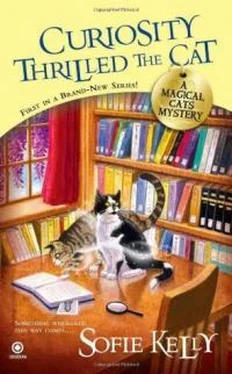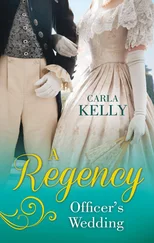I didn’t say that Easton’s death hadn’t been a heart attack—or most likely not even an accident. I wanted to see where the conversation was going.
“Because Gregor Easton was a celebrity of sorts. He died here, in Mayville Heights. To a lot of people that’s Nowhereville.” Violet poured a little more wine into her glass. “Why wouldn’t the police be extra thorough? As it is, there’s probably going to be some comments made about our ‘hick’ police department.” She looked at me. “Kathleen, you used to live in Boston. There is a big-city perception that a small town can be a little slow, isn’t there?”
“With some people, yes,” I admitted.
“What about you?” Rebecca said teasingly. “Did you think we were all a bunch of lumberjacks running around the woods in plaid flannel shirts?”
She popped a bite of fish and stuffing in her mouth.
“Not in the beginning, I didn’t,” I said. “Then my first week here Susan came to work one morning wearing a pair of fur-trimmed Sorels, a hat with earflaps and a red-and-black plaid jacket.”
Violet and Rebecca both laughed. “I think Susan feels the cold,” Rebecca said. “She’s a tiny person.”
“And plaid was in last winter,” Violet added.
“So, Susan didn’t leave you with the impression we were all a bunch of hicks?” Rebecca asked, setting her knife and fork side by side on her plate.
I took the last bite of fish and did the same. “No, she didn’t,” I said. “I’ve lived in a few small towns myself, so I’m aware of the stereotypes.”
“I thought you grew up in Boston,” Violet said. She stood to clear our plates.
“No,” I said. “I’ve lived all up and down the East Coast. My parents are actors.”
“Theater?” Violet asked.
“For the most part. My father has been in a number of commercials over the years. But most of the time they’ve been onstage.” I realized Violet had very skillfully turned the subject away from Gregor Easton and his death. Why? Was it just that she didn’t think that was suitable dinner conversation? Or did she have another reason? Beside me Roma sat silently playing with her fork.
“And you didn’t want to act?” Rebecca asked, finishing the last of her wine.
“No,” I said emphatically. “First of all, I didn’t inherit a drop of my parents’ talent. I can memorize lines, but I’m a big block of wood onstage.”
“You couldn’t be that bad,” she said.
“I could and I am. And sometimes I think acting held no interest for me because there was no lure to the exotic, the unknown.”
“What do you mean?” Violet asked, turning from the sideboard with a blueberry tart in a clear glass pie plate.
“I know how hard being an actor can be. I’ve seen the work, the rejection, the uncertainty. There’s nothing glamorous about it. Not to me.”
Violet cut a slice of the tart and handed it to Rebecca.
“What about the rest of your family?” Rebecca said, taking the plate. “Do you have any brothers or sisters?”
“I have a younger brother and sister. Twins.” Violet passed plates to both Roma and me.
“Do they act?”
I shook my head. “No. Sara is a screenwriter and filmmaker. She’s made several short films. She’s working as a makeup artist, as well. There have been enough movies made in and around Boston to keep her working pretty steadily.” I took a forkful of pie—juicy blueberries, a light custard filling and flaky pastry. “Mmmm, Violet, this is delicious,” I said.
“Thank you,” Violet said. “It’s Rebecca’s recipe.”
I raised my fork to Rebecca across the table. “Then thank you, too,” I said.
“It’s my mother’s recipe, actually,” she said. “Although I think you added a little nutmeg to the berries, didn’t you?” She looked at Violet, who was pouring coffee.
“Yes, I did,” Violet said. She handed me a cup. “You were telling us about your family. What does your brother do?”
“He’s a musician,” I said. “A drummer. He teaches jazz drumming and he’s in a band called The Flaming Gerbils.”
That pulled Roma back into the conversation. She almost choked on her coffee. “The Flaming Gerbils?”
“Uh-huh. Ethan has been in one band or another since he was a little kid. He put his first band together when he was in kindergarten. He called it Up Your Nose.”
They all laughed.
“What about you, Violet?” I asked. “Were you in a group when you were younger?”
“Not unless you count rhythm band in grade two. I played a mean triangle.”
“She did,” Rebecca said, solemnly. “Violet was a triangle virtuoso.”
“I did play rehearsal piano for pretty much anybody and everybody when I was getting my first degree,” Violet said.
“Where did you go to college?” I asked. Was it possible she’d known Gregor Easton at university?
“Oberlin College. It’s in Ohio. What about you?”
Easton had gone to the University of Cincinnati. “I went to Husson in Maine.” I smiled, remembering. “I may not have had any stereotypical ideas about Minnesota, but I definitely had them about Maine. I showed up with a suitcase full of sweaters, and they were in the middle of a late-summer heat wave.”
Thank heavens Lise had been my roommate. I wondered when I’d hear from her again. If anyone could dig up information about Gregor Easton, it would be Lise.
After we finished dessert Violet took me on a tour of the house. Every room was as beautiful as the living room and foyer. “Llŷn,” I said as we walked back into the living room. “That’s Welsh, isn’t it?”
Violet nodded. “It is. It means ‘lake.’ My mother’s parents were from Wales.”
Roma was looking at a large photograph that was hanging in the dining room. It was a street shot of the downtown by the lake, from, I guessed, at least fifty years ago. Violet joined her as Roma tried to pick out old landmarks. I sat beside Rebecca on the sofa.
“Violet’s a wonderful cook,” I said to Rebecca.
“She is. Even when we were girls she would take a recipe and change it just a little to give it her own unique touch.”
“Have you been friends a long time?”
“Forever. From the time we started school. Violet’s like my sister.” She settled back against the arm of the sofa and folded her hands in her lap. “I had two older brothers who teased me constantly. Violet was an only child. But she was fearless.”
Rebecca shook her head, smiling at something she’d remembered. “We weren’t allowed down by the lake,” she said, lowering her voice so we wouldn’t be overheard. “But we used to sneak down all the time. My brother Stephen told on us. The next morning when he got up his shoes were filled with wet sand—the pair he wore for school and his good pair for church.” She laughed at the memory. “It was Violet, but to this day I don’t know how she did it.”
I glanced toward the dining room. “It’s hard to picture Violet as a rebellious girl.”
Rebecca rubbed a hand over the sofa cushion between us. “I know she comes across as very reserved. Some people think she’s cold, but she’s not. Life has just made her seem that way.” She looked around the room. “Violet grew up in this house. She was only twenty-five when her mother and father died within six months of each other. Ten years later she was a widow with two little boys. If she seems unfeeling, well, is it any wonder? But inside she’s warm and loyal. I’ve always been able to count on her. I’d do anything for her and she’d do anything for me.”
“That’s what my mother calls sisters of the heart,” I said.
Rebecca glanced over toward Violet again. “I like that,” she said. She turned back to me. “You come from a very colorful family, Kathleen. How did you end up in Mayville Heights?”
Читать дальше












